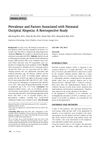
Accurate diagnosis and tailored treatments are crucial for managing hair loss in humans and animals.
PRP is a safe, low-cost treatment used in dermatology for hair loss, skin rejuvenation, scar repair, and wound healing.
 October 2018 in “Ayurlog: national journal of research in ayurveda science”
October 2018 in “Ayurlog: national journal of research in ayurveda science” The review suggests that lifestyle, diet, and environment affect hair loss, and Ayurveda offers ways to maintain hair health.
 September 2017 in “Springer eBooks”
September 2017 in “Springer eBooks” Stem cells show promise for hair loss treatment, but no effective product for hair regeneration has been developed yet.
 April 2017 in “Plastic surgical nursing”
April 2017 in “Plastic surgical nursing” Platelet-rich plasma (PRP) is an effective treatment for hair loss that involves scalp injections and requires ongoing maintenance.

Female hair loss is often hereditary and can be treated with medication, hair transplants, and lasers.
 January 2016 in “Journal of The Korean Medical Association”
January 2016 in “Journal of The Korean Medical Association” The document says how to diagnose and treat hair loss from alopecia areata, but there's no cure and treatments vary.

Some vaccines, like the hepatitis B vaccine, might be linked to the hair loss condition Alopecia Areata, but more research is needed.
 February 2014 in “Medicine - Programa De Formación Médica Continuada Acreditado”
February 2014 in “Medicine - Programa De Formación Médica Continuada Acreditado” The document concludes that non-scarring alopecias can be reversed, but scarring alopecias cause permanent hair loss.
 March 2012 in “EFSA Journal”
March 2012 in “EFSA Journal” Iron intake has not been proven to maintain normal hair growth.
October 2022 in “International Journal of Molecular Sciences” Fish collagen peptides can significantly promote hair growth.
January 2018 in “Our Dermatology Online” Dutasteride injections can help hair growth in androgenic alopecia but need more research for long-term use.
 February 2008 in “CRC Press eBooks”
February 2008 in “CRC Press eBooks” Androgenetic alopecia is a genetic hair loss condition, more severe in men, and can also be caused by hormonal imbalances in women.
 23 citations,
January 1994 in “Skin Pharmacology and Physiology”
23 citations,
January 1994 in “Skin Pharmacology and Physiology” Hair loss in men and women is linked to high stress hormone levels and other hormonal imbalances, suggesting treatments should be customized to each person's hormones.
 15 citations,
January 2011 in “Annals of Dermatology”
15 citations,
January 2011 in “Annals of Dermatology” The study concluded that neonatal occipital alopecia is common, not caused by physical friction, and usually resolves on its own without treatment.
 6 citations,
October 2015 in “International Journal of Women's Dermatology”
6 citations,
October 2015 in “International Journal of Women's Dermatology” Hair aging is inevitable, but using the right hair care products can help maintain hair health.
 1 citations,
May 2023 in “Frontiers in Endocrinology”
1 citations,
May 2023 in “Frontiers in Endocrinology” Autism's genetics are linked with early age of puberty and less hair loss, but not with hormone levels or polycystic ovary syndrome.
 1 citations,
April 2022 in “BMC Genomics”
1 citations,
April 2022 in “BMC Genomics” Researchers found genes linked to hair loss in male giant pandas.
 January 2022 in “Przegla̧d dermatologiczny”
January 2022 in “Przegla̧d dermatologiczny” The exact cause of frontal fibrosing alopecia is unknown, but it's not likely due to sunscreen.
Early diagnosis and treatment of frontal fibrosing alopecia are crucial to prevent permanent hair loss.
 January 2018 in “Deleted Journal”
January 2018 in “Deleted Journal” Managing PCOS effectively requires focusing on psychological health, lifestyle changes, and medication.

Korean patients with androgenetic alopecia may have a higher risk of heart-related health issues and could benefit from early heart screening and healthier lifestyles.
 295 citations,
January 2006 in “Journal of the American Academy of Dermatology”
295 citations,
January 2006 in “Journal of the American Academy of Dermatology” Alopecia areata, a common autoimmune hair loss condition, often runs in families.
251 citations,
October 2006 in “Plastic and reconstructive surgery/PSEF CD journals” Using platelet plasma growth factors in baldness surgery can increase the number of hair follicles.
 155 citations,
March 2009 in “Seminars in Cutaneous Medicine and Surgery”
155 citations,
March 2009 in “Seminars in Cutaneous Medicine and Surgery” Scalp cooling might reduce hair loss from chemotherapy, but evidence is weak and other treatments are being tested.
 103 citations,
June 2007 in “Endocrinology and Metabolism Clinics of North America”
103 citations,
June 2007 in “Endocrinology and Metabolism Clinics of North America” Male pattern hair loss is genetic and influenced by hormones, with treatments like minoxidil and surgery available.
 45 citations,
September 2018 in “International Journal of Women's Dermatology”
45 citations,
September 2018 in “International Journal of Women's Dermatology” PRP shows promise for hair loss treatment, with three initial monthly injections and maintenance every 3-6 months.
 44 citations,
April 2012 in “American Journal of Clinical Dermatology”
44 citations,
April 2012 in “American Journal of Clinical Dermatology” Scarring alopecias are complex hair loss disorders that require early treatment to prevent permanent hair loss.
 15 citations,
August 2019 in “Dermatologic Therapy”
15 citations,
August 2019 in “Dermatologic Therapy” Platelet-rich plasma (PRP) may help treat hair loss in patients with frontal fibrosing alopecia who don't respond to other treatments.
 6 citations,
August 2014 in “Dermatologic Surgery”
6 citations,
August 2014 in “Dermatologic Surgery” PRP injections may improve hair loss condition, but more research needed.

























